06月30日
周六
Art Therapy Introductory Workshop-Spontaneous Art Expression #1
2018年6月30日 星期六 14:00 至 16:30 音昱听堂,上海市建国西路357号,近太原路
价格: ¥300
用微信客户端扫描并分享此活动
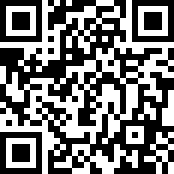
音昱听堂
音昱听堂
Art Therapy Introductory Workshop
Spontaneous Art Expression #1
by
Viviana Ni, AThR, MAAT, BAFA
Saturday, June 30th

Scribbling as a Route to the Unconscious Mind
We are delighted to invite you to a 2.5-hour introductory workshop on Art Therapy
What is Art Therapy?
Art therapy involves the use of creative techniques such as drawing, painting, collage, coloring, or sculpting to help people express themselves and examine the psychological and emotional undertones in their art work. With the guidance of a credentialed art therapist, clients can "decode" the nonverbal messages, symbols, and metaphors often found in these art forms, which should lead to a better understanding of their feelings and behavior so they can move on to resolve deeper issues.
According to British Art Therapy Association (BAAT), Art therapy is a form of psychotherapy that uses art media as its primary mode of expression and communication. Within this context, art is not used as diagnostic tool but as a medium to address emotional issues which may be confusing and distressing.
Art therapists work with children, young people, adults and the elderly. Clients may have a wide range of difficulties, disabilities or diagnoses. These include emotional, behavioral or mental health problems, learning or physical disabilities, life-limiting conditions, neurological conditions and physical illnesses.
Art therapy is provided in groups or individually, depending on clients' needs. It is not a recreational activity or an art lesson, although the sessions can be enjoyable. Clients do not need to have any previous experience or expertise in art.
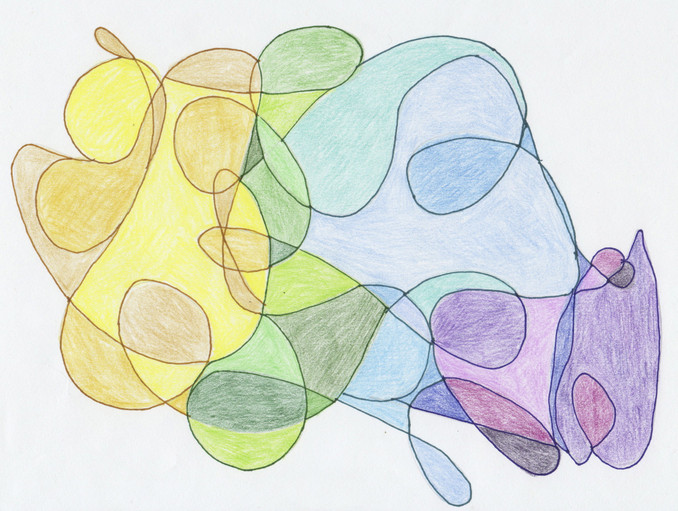
How It Works and Why scribbling
Art therapy is founded on the belief that self-expression through artistic creation has therapeutic value for those who are healing, or seeking deeper understanding of themselves and their personalities. Art therapists are trained to understand the roles that color, texture, and various art media can play in the therapeutic process, and how these tools can help reveal one’s thoughts, feelings, and psychological disposition.
Scribble drawing or squiggle games often are used as an intervention in Art Therapy, either for adults or children. which builds a non judgemental relationship between client and therapist, in order to improve the therapeutic relationship in sessions. By using this practice it can help to calm the client at the end of a difficult session.
The scribble drawing enables us to tap into our imagination or unconscious. It brings us back to child play, feeling free and loose. This helps to focus your mind on here and now, under a non-judgmental environment. When we create we tap into the subconscious mind, reframing out inner world and communication with ourselves and each other in the group.
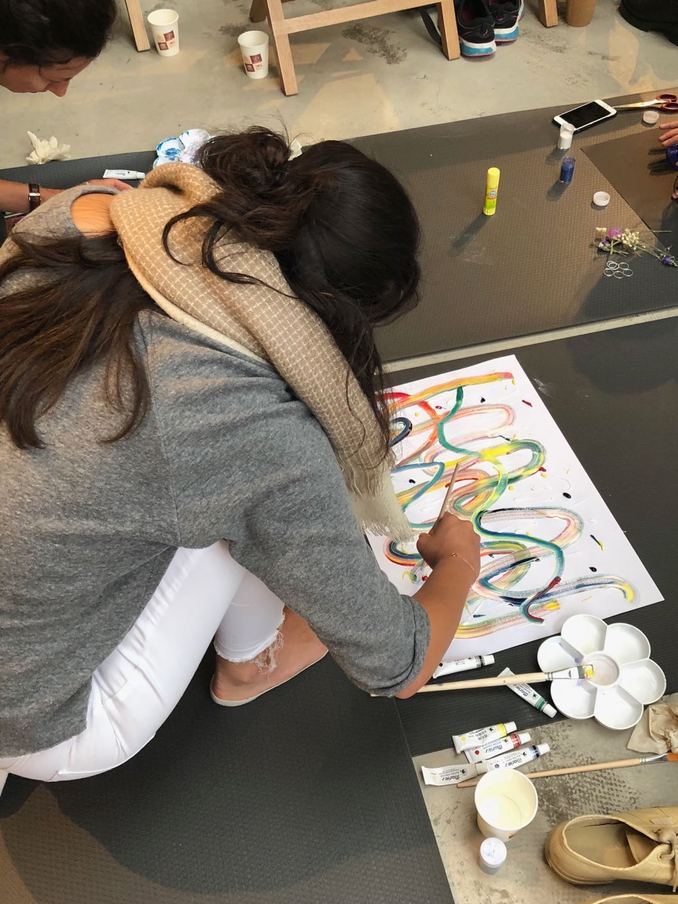
* Photo of Viviana's Previous Art Therapy Workshop
Scribble techniques also have a connection to everyone’s personal art history. We all began our expression as young artists through scribbles. Whether or not you made art as a teenager or an adult, you probably were spontaneously as a young child through scribbling lines on paper with a marker or pen, making shapes in the sandbox as the playground with your fingers and hands, and so forth.Since as young children we all began drawing scribbles, it is a natural place to begin in art therapy, especially for people who have not had much art experience or are unsure of where to start.
Margret Naumburg, who is the first people to use the term art therapy, is known for her work with patients’ spontaneous art expressions. She believed that spontaneous art expressions were an immediate and uncensored way of releasing unconscious conflicts in a visual form. Naumburg also found that through this kind of free expression, many people realized that they had undiscovered creative talent and were able to produce vivid art images even though they did not consider themselves to be artists.
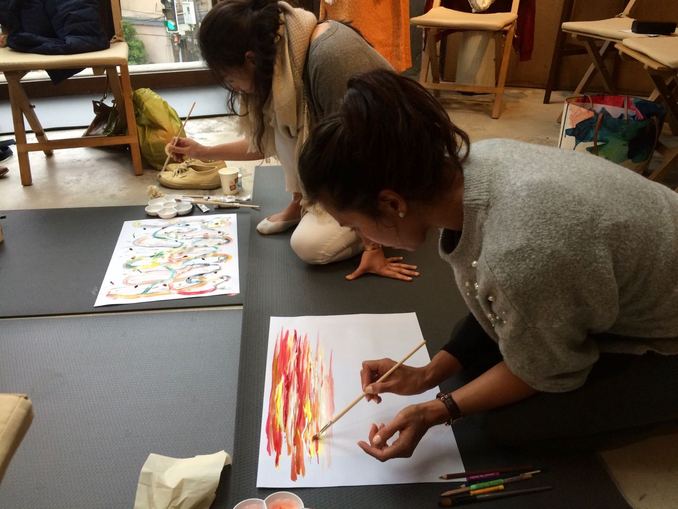
* Photo of Viviana's Previous Art Therapy Workshop
Details of the Workshop
In this workshop you will learn an overview of what is art therapy and look into few case studies that you can understand more about how art therapy works. The second part of the workshop will be the hands-on experience in Scribbling Drawings and recreate the images from the Scribbles – the different theme as previous introductory workshop.
13:45– 14:00 Registration
14:00– 14:10 Introduction – warm-up activity
14:10– 14:50 PPT – how AT can help and case studies, AT & brain function, Scribbling technique, etc.
14:50– 14:55 Q&A
14:55– 15:00 Break
15:00– 16:00 Hands-on experiences in Scribble Drawings and Recreation
16:00 –16: 20 Sharing
16:20 – 16:30 Closing activity
* NO Art Background Required
Reservation Information
Date/ Time:Saturday, 30th June 14:00– 14:30
Location: Living Room byOctave,357 JianguoWest Road x Taiyuan Road
Language: English
Price: RMB 300 / person(Price includes art materials)
Limited for 10 participants
If there are any questions,
please contact jennywu@aitiainstitute.org
or add our Customer Service WeChat: aitiacrm
In this 2.5-hour introductory workshop, you will learn the process and benefits of Art Therapy and how it differs from other modalities to connect you to your creative self.
Art therapy is widely practiced in a variety of settings around the world – including wellness centers, schools, senior communities, rehabilitation facilities and other clinical and community settings. Research supports the use of art therapy within a professional relationship for the therapeutic benefits gained through artistic self-expression and reflection for individuals who experience illness and those seeking personal growth.
Click here, link to the previous articles
About the Art Therapist
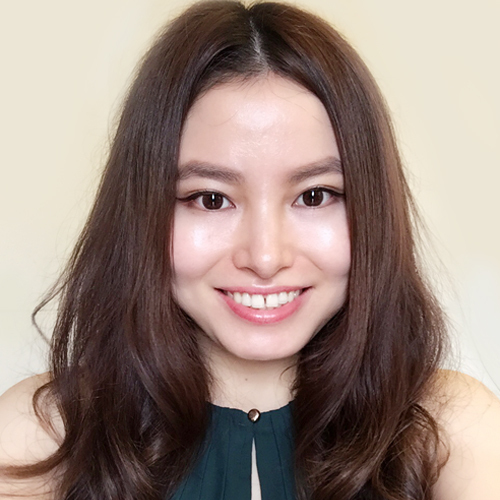
▲
Viviana Ni
AThR, MAAT, BAFA
Registered Art Therapist of Australian & New Zealand Arts Therapy Association (ANZATA)
Registered Art Therapist of Art Therapists’ Association Singapore (ATAS)
Master Degree in Art Therapy from Goldsmiths, University of London
Clinical Member of Shanghai International Mental Health Association (SIMHA)
Member of The Red Pencil Humanitarian Foundation
Former Committee member of Art Therapy’s Association Singapore (ATAS)
Former leader and initiator of Malaysian Regional Group of Australian & New Zealand Arts Therapy Association (ANZATA)
Artist
From Art to Art Therapy
Viviana graduated with a Bachelor Degree in Fine Arts with an emphasis in Oil Painting. She further incorporated body movements into her work with the guidance of esteemed performance artist, Amanda Heng from Singapore.
Viviana’s work was exhibited domestically and internationally.
An experience working with children with conditions such as autism demonstrated to Viviana the healing quality of art therapy.
Art therapy takes both the therapist and client out of the ‘traditional’ therapeutic environment of one-on-one or group discussions. This change may free a person to identify and address issues that he/she was too guarded or hesitant to address in the course of traditional or group therapy. This inspired Viviana to enter the world of art therapy.
In 2010, Viviana moved to Singapore and started her professional training in Master Degree of Art Therapy. After graduation, she registered with ANZATA and ATAS, practiced in the Southeast Asia as a professional art therapist. She has been working with a diverse population in different settings, such as, patients with mental disorders, children with traumatic experiences and survivors from domestic violence. In Shanghai, Viviana provides art therapy services to individuals, families and corporations. She has 7 years of experience in art therapy both locally and internationally.
查看更多
(021) 3338 4666
finance-tlr@livingoctave.com
Art Therapy Introductory Workshop
Spontaneous Art Expression #1
by
Viviana Ni, AThR, MAAT, BAFA
Saturday, June 30th

Scribbling as a Route to the Unconscious Mind
We are delighted to invite you to a 2.5-hour introductory workshop on Art Therapy
What is Art Therapy?
Art therapy involves the use of creative techniques such as drawing, painting, collage, coloring, or sculpting to help people express themselves and examine the psychological and emotional undertones in their art work. With the guidance of a credentialed art therapist, clients can "decode" the nonverbal messages, symbols, and metaphors often found in these art forms, which should lead to a better understanding of their feelings and behavior so they can move on to resolve deeper issues.
According to British Art Therapy Association (BAAT), Art therapy is a form of psychotherapy that uses art media as its primary mode of expression and communication. Within this context, art is not used as diagnostic tool but as a medium to address emotional issues which may be confusing and distressing.
Art therapists work with children, young people, adults and the elderly. Clients may have a wide range of difficulties, disabilities or diagnoses. These include emotional, behavioral or mental health problems, learning or physical disabilities, life-limiting conditions, neurological conditions and physical illnesses.
Art therapy is provided in groups or individually, depending on clients' needs. It is not a recreational activity or an art lesson, although the sessions can be enjoyable. Clients do not need to have any previous experience or expertise in art.

How It Works and Why scribbling
Art therapy is founded on the belief that self-expression through artistic creation has therapeutic value for those who are healing, or seeking deeper understanding of themselves and their personalities. Art therapists are trained to understand the roles that color, texture, and various art media can play in the therapeutic process, and how these tools can help reveal one’s thoughts, feelings, and psychological disposition.
Scribble drawing or squiggle games often are used as an intervention in Art Therapy, either for adults or children. which builds a non judgemental relationship between client and therapist, in order to improve the therapeutic relationship in sessions. By using this practice it can help to calm the client at the end of a difficult session.
The scribble drawing enables us to tap into our imagination or unconscious. It brings us back to child play, feeling free and loose. This helps to focus your mind on here and now, under a non-judgmental environment. When we create we tap into the subconscious mind, reframing out inner world and communication with ourselves and each other in the group.

* Photo of Viviana's Previous Art Therapy Workshop
Scribble techniques also have a connection to everyone’s personal art history. We all began our expression as young artists through scribbles. Whether or not you made art as a teenager or an adult, you probably were spontaneously as a young child through scribbling lines on paper with a marker or pen, making shapes in the sandbox as the playground with your fingers and hands, and so forth.Since as young children we all began drawing scribbles, it is a natural place to begin in art therapy, especially for people who have not had much art experience or are unsure of where to start.
Margret Naumburg, who is the first people to use the term art therapy, is known for her work with patients’ spontaneous art expressions. She believed that spontaneous art expressions were an immediate and uncensored way of releasing unconscious conflicts in a visual form. Naumburg also found that through this kind of free expression, many people realized that they had undiscovered creative talent and were able to produce vivid art images even though they did not consider themselves to be artists.

* Photo of Viviana's Previous Art Therapy Workshop
Details of the Workshop
In this workshop you will learn an overview of what is art therapy and look into few case studies that you can understand more about how art therapy works. The second part of the workshop will be the hands-on experience in Scribbling Drawings and recreate the images from the Scribbles – the different theme as previous introductory workshop.
13:45– 14:00 Registration
14:00– 14:10 Introduction – warm-up activity
14:10– 14:50 PPT – how AT can help and case studies, AT & brain function, Scribbling technique, etc.
14:50– 14:55 Q&A
14:55– 15:00 Break
15:00– 16:00 Hands-on experiences in Scribble Drawings and Recreation
16:00 –16: 20 Sharing
16:20 – 16:30 Closing activity
* NO Art Background Required
Reservation Information
Date/ Time:Saturday, 30th June 14:00– 14:30
Location: Living Room byOctave,357 JianguoWest Road x Taiyuan Road
Language: English
Price: RMB 300 / person(Price includes art materials)
Limited for 10 participants
If there are any questions,
please contact jennywu@aitiainstitute.org
or add our Customer Service WeChat: aitiacrm
In this 2.5-hour introductory workshop, you will learn the process and benefits of Art Therapy and how it differs from other modalities to connect you to your creative self.
Art therapy is widely practiced in a variety of settings around the world – including wellness centers, schools, senior communities, rehabilitation facilities and other clinical and community settings. Research supports the use of art therapy within a professional relationship for the therapeutic benefits gained through artistic self-expression and reflection for individuals who experience illness and those seeking personal growth.
Click here, link to the previous articles
About the Art Therapist

▲
Viviana Ni
AThR, MAAT, BAFA
Registered Art Therapist of Australian & New Zealand Arts Therapy Association (ANZATA)
Registered Art Therapist of Art Therapists’ Association Singapore (ATAS)
Master Degree in Art Therapy from Goldsmiths, University of London
Clinical Member of Shanghai International Mental Health Association (SIMHA)
Member of The Red Pencil Humanitarian Foundation
Former Committee member of Art Therapy’s Association Singapore (ATAS)
Former leader and initiator of Malaysian Regional Group of Australian & New Zealand Arts Therapy Association (ANZATA)
Artist
From Art to Art Therapy
Viviana graduated with a Bachelor Degree in Fine Arts with an emphasis in Oil Painting. She further incorporated body movements into her work with the guidance of esteemed performance artist, Amanda Heng from Singapore.
Viviana’s work was exhibited domestically and internationally.
An experience working with children with conditions such as autism demonstrated to Viviana the healing quality of art therapy.
Art therapy takes both the therapist and client out of the ‘traditional’ therapeutic environment of one-on-one or group discussions. This change may free a person to identify and address issues that he/she was too guarded or hesitant to address in the course of traditional or group therapy. This inspired Viviana to enter the world of art therapy.
In 2010, Viviana moved to Singapore and started her professional training in Master Degree of Art Therapy. After graduation, she registered with ANZATA and ATAS, practiced in the Southeast Asia as a professional art therapist. She has been working with a diverse population in different settings, such as, patients with mental disorders, children with traumatic experiences and survivors from domestic violence. In Shanghai, Viviana provides art therapy services to individuals, families and corporations. She has 7 years of experience in art therapy both locally and internationally.
 友付提供技术支持
友付提供技术支持
www.yoopay.cn
400.0697.118